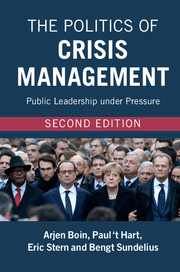Book contents
- Frontmatter
- Contents
- List of Figures
- List of Tables
- Introduction to the Second Edition
- 1 Managing Crises: Five Strategic Leadership Tasks
- 2 Sense Making: Grasping Crises as They Unfold
- 3 Decision Making and Coordinating: Shaping the Crisis Response
- 4 Meaning Making: Constructing a Crisis Narrative
- 5 Ending a Crisis: Managing Accountability
- 6 Learning and Changing: From Crisis to Reform
- 7 How to Deal with Crisis: Lessons for Prudent Leadership
- References
- Index
6 - Learning and Changing: From Crisis to Reform
Published online by Cambridge University Press: 15 December 2016
- Frontmatter
- Contents
- List of Figures
- List of Tables
- Introduction to the Second Edition
- 1 Managing Crises: Five Strategic Leadership Tasks
- 2 Sense Making: Grasping Crises as They Unfold
- 3 Decision Making and Coordinating: Shaping the Crisis Response
- 4 Meaning Making: Constructing a Crisis Narrative
- 5 Ending a Crisis: Managing Accountability
- 6 Learning and Changing: From Crisis to Reform
- 7 How to Deal with Crisis: Lessons for Prudent Leadership
- References
- Index
Summary
Never Again!
Conventional wisdom suggests that human progress requires that we learn from our failures. As crises unearth failing policies, procedures, and organizations, they provide clear-cut opportunities to learn and adapt. We would therefore expect policy makers to study what went wrong before and during a crisis and to change ideas, policies, structures, and processes in accordance with their findings.
In a context of competing accounts of what happened it is, however, not so easy to determine what went wrong and what should be adapted to prevent similar crises from happening again. Many different and sometimes contradictory lessons can be distilled from one and the same crisis experience. Moreover, stakeholders often disagree on what the right lessons are. As we have seen in Chapter 5, the post-crisis period is not necessarily one of social unity, mindful inquiry, and dispassionate reflection. The adversarial politics of the aftermath will affect the identification and selection of the lessons to be learned from crisis. Even when there is agreement on certain measures to be taken, there is no guarantee that lessons learned will actually be implemented. And consensus about lessons does not necessarily mean that the lessons will be sufficient to prevent similar mistakes from happening in the future.
Consider the rash of new policies, legal changes, and major institutional reforms and reorganizations that were pushed through the legislature at unprecedented speed after the 9/11 events – in the United States, the European Union, and many other countries. In the U.S., the so-called Patriot Act was adopted in near unanimity, enacting policy changes in the judicial system, in the handling of immigrants and resident aliens, and in the allocation of government funds for national security and public safety. In a major administrative reorganization effort, many security-related and emergency management agencies were merged at the stroke of a pen into the vast Department of Homeland Security. The department, with its 170,000 employees and wide responsibilities for dealing with different contingencies, could not prevent – and some would say contributed to – a botched response to Hurricane Katrina (summer of 2005).
The European Union learned and changed in much more incremental fashion. A uniform definition of terrorism was accepted; extradition rules for potentially terrorism-related crimes were extended. Police units can now track suspected criminals across national borders and, if necessary, act with full authority on foreign soil.
- Type
- Chapter
- Information
- The Politics of Crisis ManagementPublic Leadership under Pressure, pp. 126 - 144Publisher: Cambridge University PressPrint publication year: 2016



